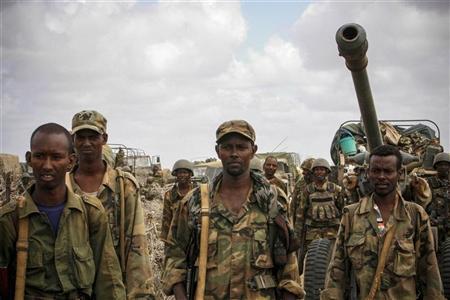By Abdi Sheikh
MOGADISHU (Reuters) – Hundreds of Somali government troops and allied militia fighters deployed throughout the former al Shabaab rebel stronghold of Kismayu on Monday, sending panicked locals scrambling for cover.

Residents said some soldiers took up positions on rooftops and that there was no immediate retaliation from the al Qaeda-linked militants who fled the port city on Friday after Kenyan and Somali troops launched an assault by sea, air and land.
“We have now seen troops walking in the town. We are running into houses and shops have closed. We are afraid of explosions,” said resident Ismail Nur.
Mohamud Farah, a spokesman for Somali’s army in the southern Juba regions, said 450 government soldiers and fighters from an allied militia were in the city centre to patrol the sandy streets and twisting alleyways.
Another resident, Halima Farah, said Kismayu had turned into a ghost-town. Troops had occupied the police headquarters building and district administration office, she said.
“I can also see through the cracks of windows that some of them are on the rooftops near those positions,” Farah told Reuters by telephone.
Johnnie Carson, U.S. assistant secretary of state for African affairs, said the recapture of Kismayu marked “a major step forward” and applauded the military gains made by the African Union’s peacekeeping force in Somalia.
“We believe this will help to bring about a return to stability in Somalia and will reduce over time the terrorist threat to Somalis and to neighbouring states,” Carson told reporters on a conference call.
The rebel group, which counts foreign al Qaeda-trained fighters among its ranks, is seen as one of the biggest threats to stability in the Horn of Africa. It formally merged with al Qaeda in February.
Al Shabaab has said that although it had retreated from Somalia’s second biggest city, its fighters were poised to engage the allied troops once they entered the city centre, threatening to turn the streets into a “battlefield”.
“FALLING INTO OUR TRAP”
“Their going in means falling into our trap. Just wait and see what will happen to them,” Sheikh Abdiasis Abu Musab, the spokesman for al Shabaab’s military operation told Reuters.
Kenya’s military used the social media site Twitter to declare its forces had established no-fire zones around markets, schools, mosques and hospitals.
A Kenyan military spokesman was not immediately available for comment.
Residents said it was unclear if Kenyans were in the city centre or still camped out on the outskirts and were divided over whether the arrival of government forces in the city was positive.
Winning control of Kismayu, however, is the easy part, while establishing a political administration respected by all clans will be much tougher, political analysts say.
A prolonged power vacuum in Kismayu might give way to renewed violence as rival groups jockey for control of the lucrative port in a city where the rebels’ strict application of Islamic law alienated a huge portion of the population.
“(We hope) the government in Mogadishu … will go in very quickly and establish political stability and a political system that takes into account the various clan and sub-clan interests,” Washington’s Carson said.
Faiza Mohamed, a greengrocer, feared a new wave of violence.
“We’re not against the government, but Kismayu will become like Mogadishu,” she said, referring to al Shabaab’s campaign of suicide bombings and targeted killings that has swept the capital since the group withdrew from there 14 months ago.
Al Shabaab, which controlled swathes of south-central Somalia for much of its five-year rebellion, has increasingly turned to guerrilla tactics as it loses ground under military pressure.
It was swift to harass the weak government of newly-elected President Hassan Sheikh Mohamud with suicide bombings and assassinations.
KENYA ON HIGH ALERT
Security forces in Kenya, the region’s biggest economy, were on high alert on Monday.
Police said extra roadblocks had been set up on roads leading to neighbouring Somalia, while a military source said extra surveillance flights were being operated along the remote, porous frontier.
“Somalia has been an al Qaeda hideout. You’ve seen the impact of al Qaeda across the world and we have just destroyed their backyard,” Kenya’s deputy police spokesman Charles Owino told Reuters.
Since it sent troops into Somalia a year ago, Kenya has been dogged by a succession of gun and grenade attacks, blamed by the government in Nairobi on al Shabaab and its sympathisers.
Such low-level attacks have so far not hurt Kenya’s financial markets.
However, a major strike of the kind threatened by al Shabaab on Kenyan government buildings or sites popular with Western expatriates and holidaymakers would risk dealing a body-blow to the tourism sector and damaging Kenya’s reputation as a sound investment destination in a volatile region.
The militants proved their ability to launch a major strike beyond Somalia’s frontiers when suicide bombers killed 79 people in the Ugandan capital, Kampala, in 2010.





